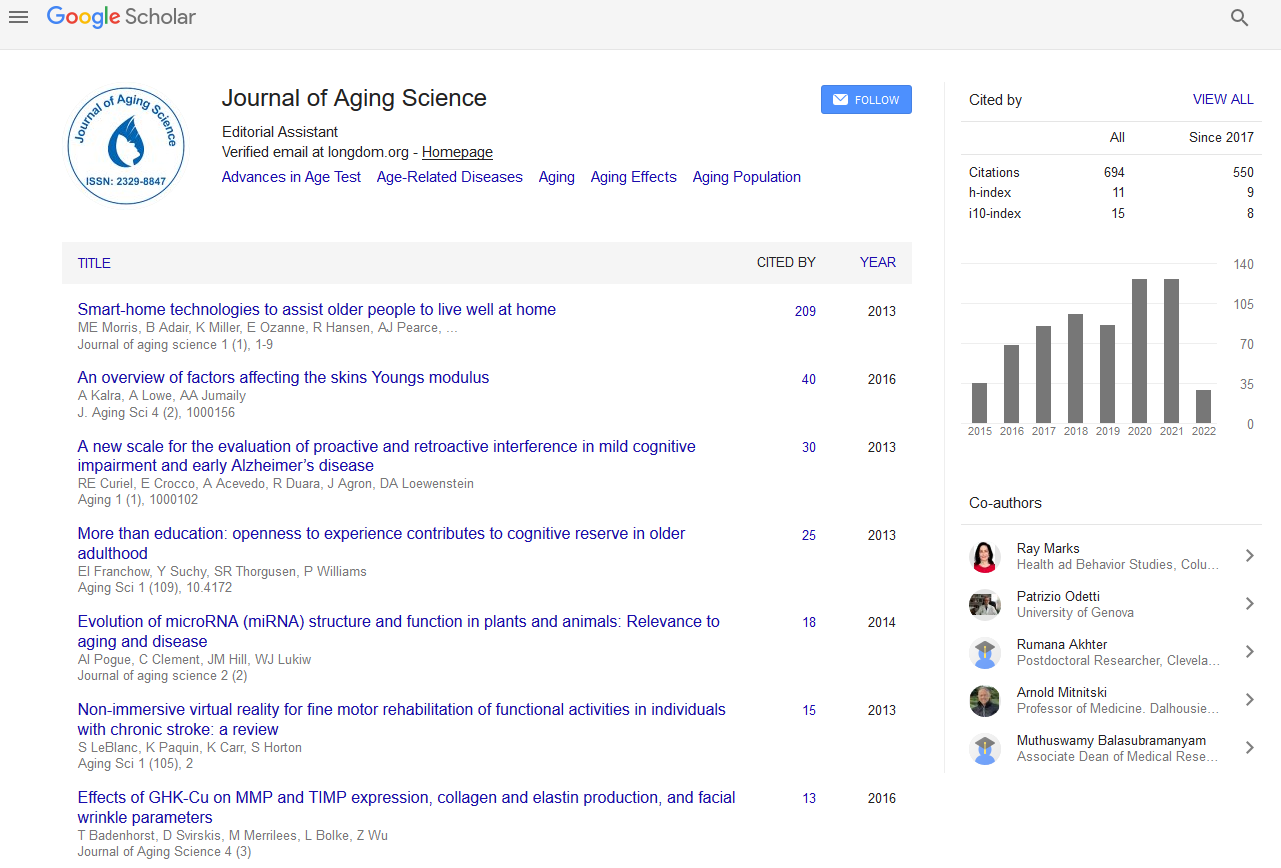PMC/PubMed Indexed Articles
Indexed In
- Open J Gate
- Academic Keys
- JournalTOCs
- ResearchBible
- RefSeek
- Hamdard University
- EBSCO A-Z
- OCLC- WorldCat
- Publons
- Geneva Foundation for Medical Education and Research
- Euro Pub
- Google Scholar
Useful Links
Share This Page
Journal Flyer

Open Access Journals
- Agri and Aquaculture
- Biochemistry
- Bioinformatics & Systems Biology
- Business & Management
- Chemistry
- Clinical Sciences
- Engineering
- Food & Nutrition
- General Science
- Genetics & Molecular Biology
- Immunology & Microbiology
- Medical Sciences
- Neuroscience & Psychology
- Nursing & Health Care
- Pharmaceutical Sciences
RECOVERY OF STEM CELL SENESCENCE BY PLATELET RICH PLASMA TO DELAY ANIMAL AGING
International Conference on Aging & Gerontology
August 8-9, 2016 Las Vegas, USA
Win-Ping Deng
Taipei Medical University Stem Cell Center, Taiwan
Keynote: Aging Sci
Abstract:
Aging is a process related to loss of functional stem cell and then loss of tissue and organ regeneration potentials. Our previous result demonstrated that the life span of OVX-SAMP8 mice was significantly prolonged and similar to that of the congenic senescence-resistant strain of mice after Platelet Rich Plasma (PRP)/embryonic fibroblast transplantation. This study is aimed to investigate the potential of PRP to recover cellular potential from senescence and then to delay animal aging. We first examined whether stem cells would be senescent in aged mice compared to young mice. Primary Adipose derived Stem Cells (ADSCs) and Bone Marrow derived Stem Cells (BMSCs) were harvested from young and aged mice, and found that cell senescence was strongly correlated with animal aging. Subsequently, we demonstrated that PRP could recover cell potential from senescence, such as promote cell growth (cell proliferation and colony formation), increase osteogenesis, decrease adipogenesis, restore cell senescence related markers and resist the oxidative stress in stem cells from aged mice. The results also showed that PRP treatment in aged mice could delay mice, aging as indicated by survival, body weight and aging phenotypes (behavior and gross morphology) in term of recovering the cellular potential of their stem cells compared to the results on aged control mice. We concluded that PRP has potential to delay aging through the recovery of stem cell senescence and could be used as an alternative medicine for tissue regeneration and future rejuvenation.
Biography :
Win-Ping Deng obtained his doctorate in cancer biology from Harvard University in 1993. Wing-Ping then joined the postdoctoral training at Jac A. Nickoloff’s lab where he directed research of preferential repair of UV damage in highly transcribed DNA and research of mismatch repair of heteroduplex DNA intermediates of extrachromosomal recombination in mammalian cells. This led to the development of powerful genetic recombination analysis in mammalian cells. In 2000, he joined the faculty of the College of Oral Medicine at the Taipei Medical University where now he is the Distinguished University Professor and Deputy Dean at TMU. He pioneered a new research for combining stem cell and molecular imaging to study the cancer therapy or tissue regeneration.
Email: wpdeng@tmu.edu.tw


